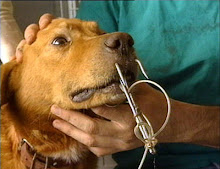NC State Is First University in Nation to Offer Canine Bone Marrow Transplants
Media Contact(s)
Tracey Peake, News Services, (919) 515-6142
Sept. 3, 2008
FOR IMMEDIATE RELEASE
Dogs suffering from lymphoma will be able to receive the same type of medical treatment as their human counterparts, as North Carolina State University becomes the first university in the nation to offer canine bone marrow transplants in a clinical setting.
Dr. Steven Suter, assistant professor of oncology in NC State's College of Veterinary Medicine, received three leukophoresis machines donated by the Mayo Clinic in Rochester, Minn. Leukophoresis machines are designed to harvest healthy stem cells from cancer patients. The machines are used in conjunction with drug therapy to harvest stem cells that have left the patient's bone marrow and entered the bloodstream. The harvested cancer-free cells are then reintroduced into the patient after total body radiation is used to kill residual cancer cells left in the body. This treatment is called peripheral blood stem cell transplantation.
The machines, once used for human patients, are suitable for canine use without modification, as bone marrow therapy protocols for people were originally developed using dogs.
"It's not a new technology, it's just a new application of an existing technology," Suter says. "Doctors have been treating human patients with bone marrow transplantation for many years, and there have been canine patient transplants performed in a research setting for about 20 years, but it's never been feasible as a standard therapy until now."
Canine lymphoma is one of the most common types of cancer in dogs, but the survival rate with current treatments is extremely low. Peripheral blood stem cell transplantation, in conjunction with chemotherapy, has raised human survival rates considerably, and it is hoped that dogs will see the same benefits.
"We know that dogs who have received bone marrow transplants have a cure rate of at least 30 percent versus about 0 to 2 percent for dogs who don't receive the transplants," Suter adds. "The process itself is painless for dogs - the only thing they lose is a bit of body heat while the cells are being harvested."
- peake -
Thursday, September 4, 2008
Subscribe to:
Post Comments (Atom)

















3 comments:
Where ever I am I always find myself looking out the window wishing I was somewhere else.
Wow that's really amazing. I really hope other facilities implement this type of life saving surgery.
Thank you Dr. Steven Suter!
nice blog :)
Post a Comment